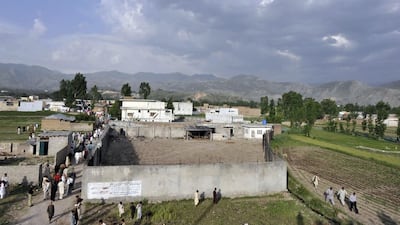Osama bin Laden refuses to die – even from the afterlife he creates problems. The latest incident concerning him is a row that has erupted between the provincial government of Khyber Pakhtunkhwa and the military over what to do with the house where he was killed in Abbottabad.
Relations between elected officials in Pakistan and the military are seldom smooth, but this seems, on the face of it, entirely unnecessary.
Abu Ahmed Al Kuwaiti, or Arshad Khan, his local pseudonym, was an aide of bin Laden. When it was decided that he would seek safe haven in Pakistan, Al Kuwaiti bought the land. The Abbottabad house was completed in 2005, after which bin Laden moved in.
In May 2011, US forces raided it and killed him. The house was razed in 2012.
The entire plot measures about 3,500 square metres, and it has remained unoccupied and in the possession of the provincial authorities. Now it seems that, while the provincial government wants to construct a playground for children that could also be used as a prayer area, the military wants to build a cemetery on the plot.
In the 1990s, bin Laden acquired quite a following in Pakistan. He was viewed as a mythical hero who challenged the might of the United States. As many as 10,000 newborn male children were named after him. Since then, his committed admirers have diminished drastically, but there are still a few.
When bin Laden was killed, the military faced a huge backlash. That he had lived in Pakistan undetected for six years was embarrassing enough, but the fact that US troops flew in undeterred, killed him and left unchallenged, was worse.
To add insult to injury, bin Laden had lived a stone’s throw from the Pakistan Military Academy.
With bin Laden adherents thronging the area in the aftermath of his execution, the military’s greatest fear was the possibility of a cult sprouting up. And that if it did, that it would naturally gravitate to the location where he died.
If that were to happen, with the military academy next door, the coexistence of it and a bin Laden cult would be unacceptable. Moving the military facility would not only cost a great deal of money, but it would take years.
In my view, that is the crux of the military’s concern. The dispute between the provincial government and the military controlled cantonment board has been continuing, but recently the latter constructed a wall around the plot, effectively occupying it. Officials countered that the military had walled it in to prevent encroachments.
I can sympathise with the military’s concern with having it converted to a prayer ground. Anything that remotely smacks of a religious function, particularly public prayers, could easily become the centre for a cult. In South Asia, cults grow merely on legends and this might be viewed as “hallowed” ground by a few wrong-headed fanatics.
On the other hand, the military wants to convert it into a cemetery. The provincial government’s objection is based on the fact that it lies in the middle of a crowded residential area, which may be seen as inappropriate.
The objection is valid, not least because a 3,500 sq m plot can hold no more than 2,000 graves, and that would be a huge squeeze. The facility could be filled in as little as two years.
But, there is a far more serious reason than that for not converting it into a graveyard. If a prayer ground could be converted into a base for a cult, a graveyard is far more likely to be one.
A far better idea is to espouse the provincial government’s proposal. Convert it, instead, into a fully equipped children’s amusement park run by a foreign firm on a long-term contract. The military can agree to facilitate the entire proposal.
If I have correctly identified the military’s concerns on the subject, this should address it without unnecessarily rubbing elected leaders the wrong way. But the military can, sometimes, be even more bureaucratic than the worst bureaucracy.
Brig Shaukat Qadir is a retired Pakistani infantry officer

